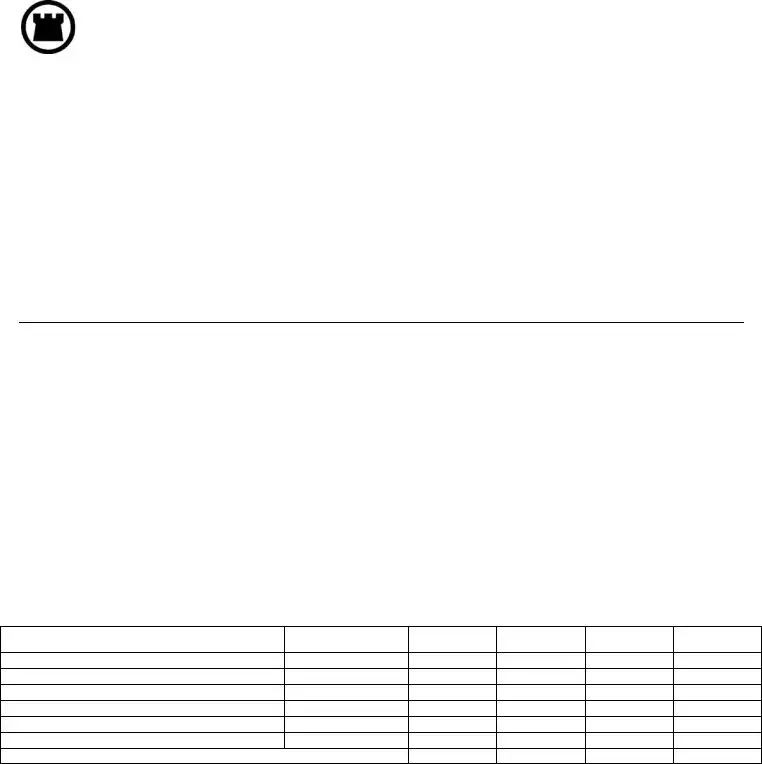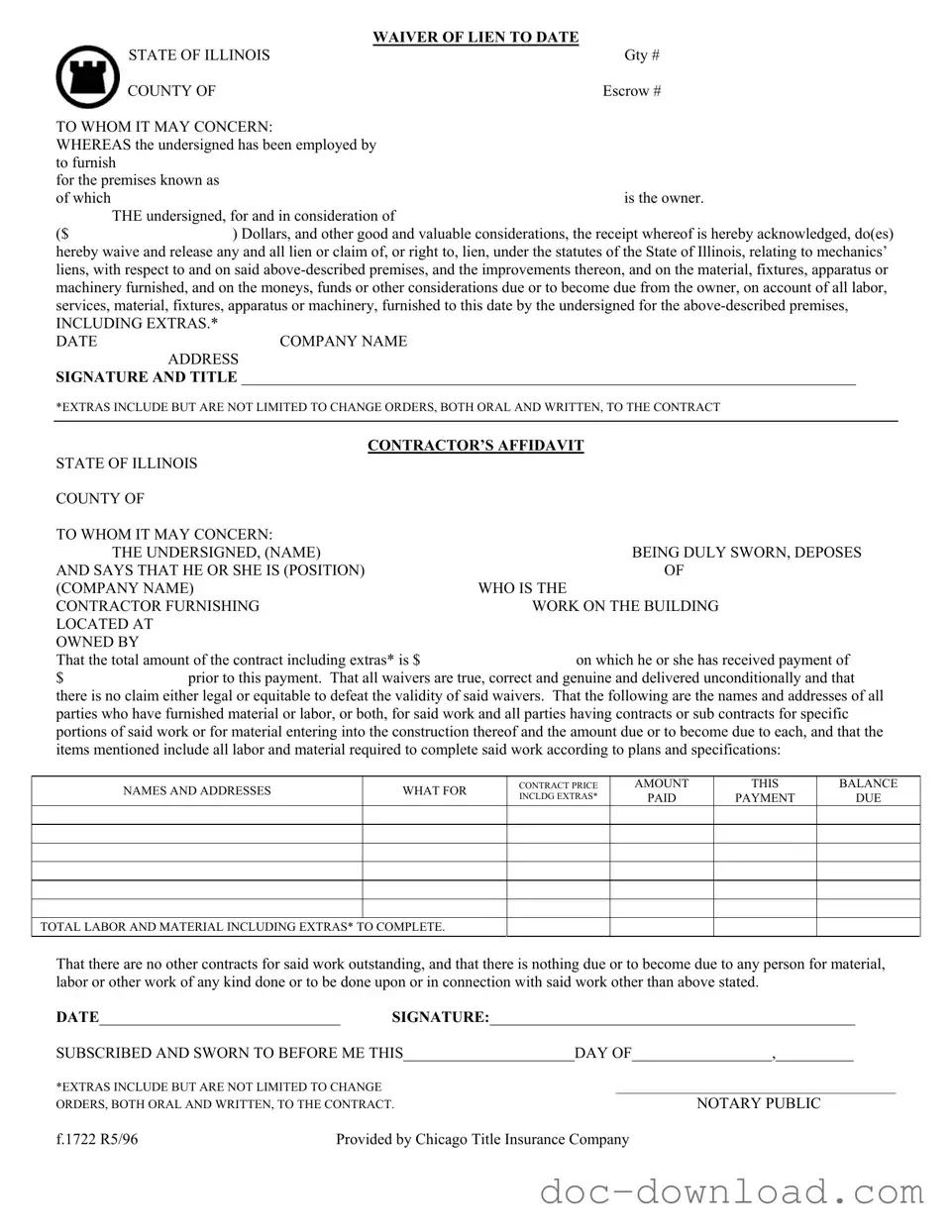Fill Out Your Chicago Title Waiver Format Template
The Chicago Title Waiver Format form serves a critical role in the construction and real estate industries, particularly within the state of Illinois. This document is designed to protect property owners from potential liens that could arise from unpaid work or materials. By signing this form, contractors and subcontractors agree to waive their rights to file a lien against the property for the work they have completed or materials they have supplied. The form includes essential details such as the company name, the premises involved, and the total contract amount, including any extras. It also requires a sworn affidavit from the contractor, confirming the accuracy of the waivers and providing a comprehensive list of all parties involved in the project. This not only ensures transparency but also reassures property owners that they are not liable for additional claims. Furthermore, the document emphasizes the importance of clear communication regarding payments and outstanding balances, ultimately fostering trust between all parties involved in a construction project.
Similar forms
The Chicago Title Waiver Format form is similar to the Construction Lien Waiver, which is often used in construction projects. This document serves to confirm that a contractor or subcontractor has received payment for their work and waives any future lien rights against the property. Like the Chicago Title Waiver, it includes details about the project, the amounts paid, and the work completed. Both documents aim to protect property owners from potential claims by ensuring that all parties involved acknowledge receipt of payment and relinquish their right to file a lien.
When navigating the complexities of property ownership, utilizing a quitclaimdeedtemplate.com/michigan-quitclaim-deed-template/ can offer clarity and simplify the transfer process, ensuring that all parties are informed and protected during the transaction.
Another document similar to the Chicago Title Waiver is the Partial Lien Waiver. This waiver is used when a contractor or supplier has received a portion of their payment but has not yet been fully compensated for their work. The Partial Lien Waiver allows them to waive their lien rights only for the amount they have received, while still retaining the right to file a lien for the remaining balance. This structure mirrors the Chicago Title Waiver’s intent to clarify financial transactions and protect the property owner from future claims.
The Final Lien Waiver is also comparable to the Chicago Title Waiver. This document is executed upon final payment for a project, confirming that the contractor or subcontractor has received full compensation for their work. By signing the Final Lien Waiver, the party relinquishes all rights to file a lien on the property. This aligns with the Chicago Title Waiver’s purpose of ensuring that all financial obligations are settled and that the property owner is safeguarded from potential lien claims.
The Contractor’s Affidavit is another document that shares similarities with the Chicago Title Waiver. This affidavit is a sworn statement from the contractor, affirming that they have received payment and that all subcontractors and suppliers have been paid as well. It provides a detailed account of the work performed and any outstanding balances. Both documents serve to protect the property owner by confirming that all parties involved in the project have been compensated appropriately.
The Subcontractor Lien Waiver is also akin to the Chicago Title Waiver. This document is used by subcontractors to waive their lien rights after receiving payment for their work. It ensures that the property owner is not held liable for claims from subcontractors, similar to how the Chicago Title Waiver releases lien rights in exchange for payment. Both documents emphasize the importance of clear financial transactions in construction projects.
The Material Supplier Lien Waiver is another similar document. This waiver is utilized by suppliers of materials to confirm that they have received payment and to relinquish their right to file a lien against the property. Like the Chicago Title Waiver, it helps to ensure that the property owner is protected from potential claims related to unpaid materials. Both documents play a crucial role in maintaining transparency and accountability in financial dealings within construction projects.
The Conditional Lien Waiver is also relevant when discussing documents similar to the Chicago Title Waiver. This waiver is executed when a contractor or supplier agrees to waive their lien rights, but only on the condition that they receive payment. This means that if payment is not made, the lien rights remain intact. This conditional aspect contrasts with the Chicago Title Waiver, which often signifies that payment has already been received, but both serve to clarify the financial obligations of all parties involved.
Lastly, the Release of Lien form is comparable to the Chicago Title Waiver. This document is used to formally release a lien that has already been filed against a property. It confirms that the lien has been satisfied, allowing the property owner to clear the title. Similar to the Chicago Title Waiver, the Release of Lien serves to protect property owners from future claims and reinforces the completion of financial transactions related to construction work.
Form Specifications
| Fact Name | Description |
|---|---|
| Purpose | The Chicago Title Waiver Format form is used to waive any lien rights under Illinois law for work performed on a property. |
| Governing Law | This form is governed by the mechanics' lien statutes of the State of Illinois. |
| Consideration | The undersigned must acknowledge receipt of a specified dollar amount or other valuable considerations for the waiver to be valid. |
| Contractor's Affidavit | The form includes a section where the contractor swears to the truth of the information provided regarding payments and materials. |
| Extras Definition | Extras refer to additional work or change orders, whether oral or written, that are included in the contract. |
Different PDF Templates
What Is I-9 - It verifies employment for individuals working on commission.
Owner Operator Lease Agreement Pdf - Owner Operator must provide evidence of compliance with insurance requirements to the Carrier.
A Georgia Deed form is an essential document used to legally transfer property from one person to another. This form serves as evidence that the property owner has conveyed their interest in the property to the new owner. Completing this form correctly ensures that the transfer is recognized by law, securing the new owner's rights to the property. For more information, you can access Georgia PDF Forms.
Chart Ms Word - Collaboration: Useful for group projects where multiple inputs are needed.
Sample - Chicago Title Waiver Format Form

WAIVER OF LIEN TO DATE |
|
S STATE OF ILLINOIS |
Gty # |
COUNTY OF |
Escrow # |
TO WHOM IT MAY CONCERN: |
|
WHEREAS the undersigned has been employed by |
|
to furnish |
|
for the premises known as |
|
of which |
is the owner. |
THE undersigned, for and in consideration of
($) Dollars, and other good and valuable considerations, the receipt whereof is hereby acknowledged, do(es) hereby waive and release any and all lien or claim of, or right to, lien, under the statutes of the State of Illinois, relating to mechanics’ liens, with respect to and on said
INCLUDING EXTRAS.* DATE
ADDRESS
SIGNATURE AND TITLE _______________________________________________________________________________
*EXTRAS INCLUDE BUT ARE NOT LIMITED TO CHANGE ORDERS, BOTH ORAL AND WRITTEN, TO THE CONTRACT
CONTRACTOR’S AFFIDAVIT
STATE OF ILLINOIS
COUNTY OF |
|
TO WHOM IT MAY CONCERN: |
|
THE UNDERSIGNED, (NAME) |
BEING DULY SWORN, DEPOSES |
AND SAYS THAT HE OR SHE IS (POSITION) |
OF |
(COMPANY NAME) |
WHO IS THE |
CONTRACTOR FURNISHING |
WORK ON THE BUILDING |
LOCATED AT |
|
OWNED BY |
|
That the total amount of the contract including extras* is $ |
on which he or she has received payment of |
$prior to this payment. That all waivers are true, correct and genuine and delivered unconditionally and that there is no claim either legal or equitable to defeat the validity of said waivers. That the following are the names and addresses of all parties who have furnished material or labor, or both, for said work and all parties having contracts or sub contracts for specific portions of said work or for material entering into the construction thereof and the amount due or to become due to each, and that the items mentioned include all labor and material required to complete said work according to plans and specifications:
NAMES AND ADDRESSES
WHAT FOR
CONTRACT PRICE INCLDG EXTRAS*
AMOUNT
PAID
THIS
PAYMENT
BALANCE
DUE
TOTAL LABOR AND MATERIAL INCLUDING EXTRAS* TO COMPLETE.
That there are no other contracts for said work outstanding, and that there is nothing due or to become due to any person for material, labor or other work of any kind done or to be done upon or in connection with said work other than above stated.
DATE_______________________________ |
SIGNATURE:_______________________________________________ |
||
SUBSCRIBED AND SWORN TO BEFORE ME THIS______________________DAY OF__________________,__________ |
|||
*EXTRAS INCLUDE BUT ARE NOT LIMITED TO CHANGE |
|
_____________________________________________ |
|
ORDERS, BOTH ORAL AND WRITTEN, TO THE CONTRACT. |
NOTARY PUBLIC |
||
f.1722 R5/96 |
Provided by Chicago Title Insurance Company |
||
